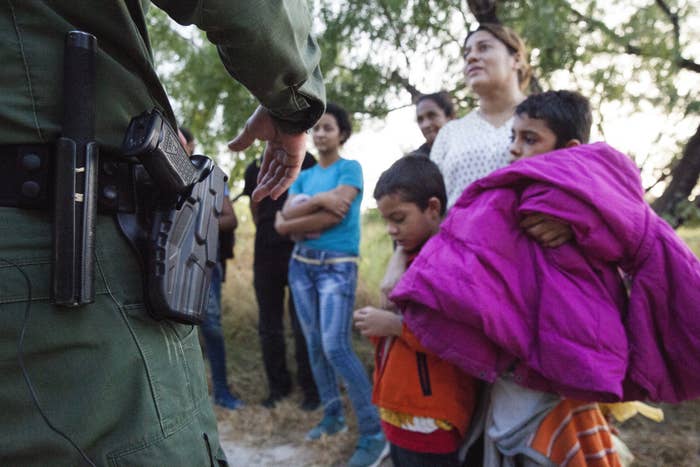
Department of Homeland Security officials lacked the technology to track all the immigrant families who were separated at the southern border, so a government watchdog can’t confirm if there were more than reported and if they have been reunified, according to an unpublished report from the agency’s Office of Inspector General and obtained by BuzzFeed News.
The poor reporting mechanisms were known to US Customs and Border Protection officials for months but went unaddressed during the zero-tolerance plan that broke up hundreds of families, the report adds.
“The Zero Tolerance Policy was in place for only 6 weeks. Although intended to reduce the practice of ‘catch-and-release,’ the policy had the unexpected consequences of overburdening [Customs and Border Protection] and ICE resources, and over-taxing facilities for detaining migrants at the southwest border,” the report states. “These conditions were exacerbated by thousands of children separated from their parents and DHS’ inability to reunify families as mandated due to poor data entry, data tracking, information sharing, and IT systems capabilities.”
The inspector general reported that while DHS said 3,014 families had been separated during the enforcement of the zero-tolerance policy, which lasted from May into late June in 2018 and led to an increase of prosecutions of adults who crossed the US border without authorization, they could not confirm that figure.
“However, we conducted a review of DHS data during the Zero Tolerance period and identified 136 children with potential family relationships who were not accurately recorded by CBP,” the auditors say in the report. “In a broader analysis of DHS data between the dates of October 1, 2017, to February 14, 2019, we identified an additional 1,233 children with potential family relationships that were not accurately recorded by CBP.”
The result, the inspector general said, was that “without a reliable account of all family relationships, we cannot confirm that DHS has identified all family separations, and therefore, we cannot determine whether DHS and [Health and Human Services] have reunified these families.”
Last year, the inspector general released an initial report that indicated widespread problems with the separation policy, including technology limitations and data errors.
The final report, which is due to be released publicly Wednesday, indicates that CBP officials knew of the technology issues prior to implementing the zero-tolerance policy, but did not address it.
CBP itself had been preparing to separate upward of 26,000 children from May to September 2018, according to an estimate provided to the Office of Management and Budget.
“CBP officials have been aware of these IT deficiencies since at least November 2017 when US Border Patrol conducted an initiative that mirrored the Zero Tolerance Policy,” the report states. “These conditions persisted because CBP did not address its known IT deficiencies adequately before DHS implemented Zero Tolerance in May 2018.”
One senior CBP official told the inspectors that pressure to quickly implement the policy may have led to the subsequent issues.
“One senior CBP official who participated in Zero Tolerance Policy planning meetings stated that key stakeholders had pressured DHS to implement the policy in early May 2018 before identified deficiencies in” the technology were “resolved.”
The report also details major issues with a zero-tolerance pilot project in El Paso in 2017, first reported about by the Houston Chronicle.
“In a July 2017 draft memo, El Paso Sector management acknowledged concerns from local judges that Border Patrol, [ICE], and [Office of Refugee Resettlement] needed a coordinated reunification plan for rejoining and repatriating families. However, they never developed a plan and children separated under the El Paso initiative could have remained separated from their parents for a long period,” the report states. “One HHS official stated he first became aware of family separations in August 2017 during the El Paso initiative when CBP transferred an infant to ORR. The infant was not reunited with her mother for at least six months.”
